Rugby League star: '˜'Every single moment of every single day, I was thinking about committing suicide'
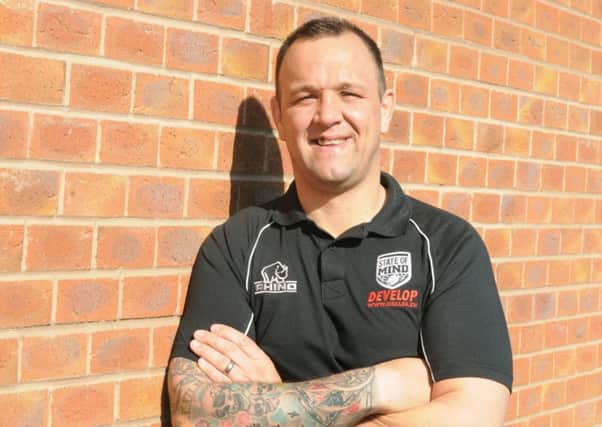

Armed with a bottle of gin and enough pills to “kill half of Wigan” Danny Sculthorpe found himself in a car park at rock bottom ready to end his own life.
“I was so close to doing it” admits Danny, now 37. “If I had gone through with it, it certainly would not have been a halfhearted attempt as I had so many pills and was determined to do it.
Advertisement
Hide AdAdvertisement
Hide Ad“But at the last second, something stopped me. Whether it was the thought of leaving my kids, my wife, my parents and my brothers and the devastation I would leave behind I don’t know.
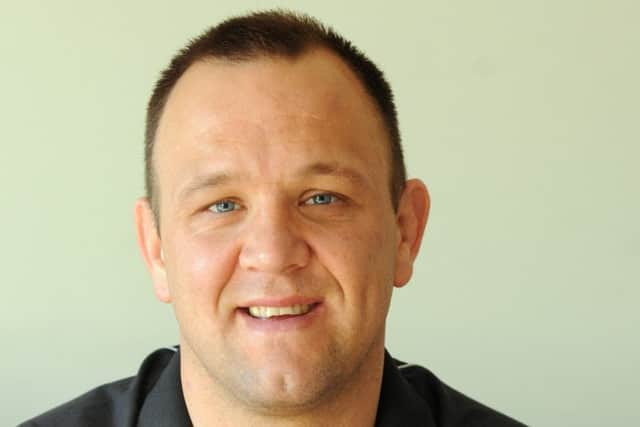

“I remember going home from the car park and feeling really disappointed in myself for not going through with it.
“The plan had not come to fruition and I went back to that feeling of uselessness and not knowing what was going to happen in the future.”
Danny, who lives in Billinge, near Wigan and is married to Natalie with children Ellie, 10, Louie, eight and Isla, three, contemplated suicide after an injury brought his rugby league career to a premature end in 2010.
Advertisement
Hide AdAdvertisement
Hide AdThe former prop who played for Wigan Warriors, Rochdale Hornets, represented Lancashire and was capped eight times for England as well as being captain on the England tour to South Africa.
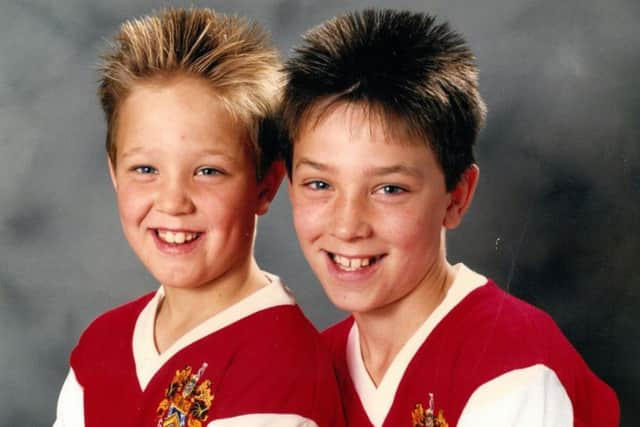

Danny, who played just short of 300 matches in his career also played in the 2004 Challenge Cup final for Wigan against St Helens and had stints at Castleford Tigers, Wakefield Trinity Wildcats and Huddersfield Giants.
Danny, who is the younger brother of former player Paul Sculthorpe who was a legend at St Helens, began playing rugby league at the age of six and says the sport was his whole life and all he had ever known.
So when it all came to an abrupt end after an injury, Danny confesses to feeling “lost and helpless” and he spiralled into depression which culminated in his near-suicide attempt.
Advertisement
Hide AdAdvertisement
Hide AdIt all unfolded after Danny signed a four-year deal for Bradford Bulls in 2010 - but didn’t actually end up making a single appearance for them.
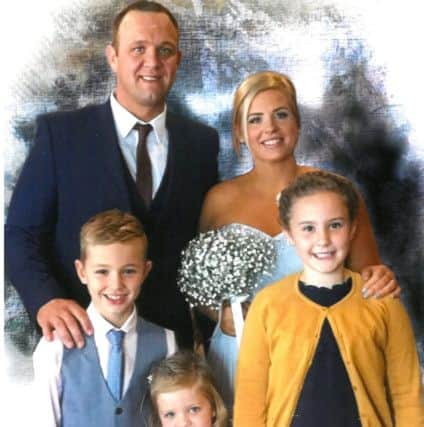

Danny recalls: “I signed in the October and was straight into pre-season training.
“The injury happened in the third week of pre-season. I was in the gym squatting when I prolapsed a disc in my spine.
“I remember feeling a sharp pain in my back. But that went away and then it went sciatic down my right leg.”
Advertisement
Hide AdAdvertisement
Hide AdDanny tried to train the following day but couldn’t and had numerous scans and epidurals.
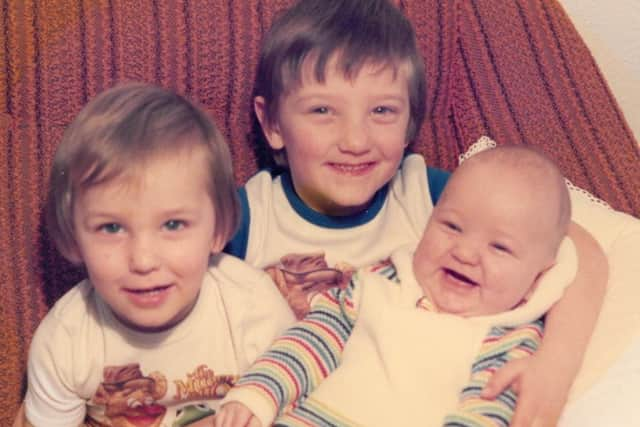

Danny ended up having surgery and had the disc shaved which released the sciatic nerve and his pain disappeared.
However, about a week after the operation, Danny began experiencing really bad pains in his back.
Danny says: “I knew something wasn’t right as I didn’t have back pain before they shaved the disc. It was all sciatic.”
Advertisement
Hide AdAdvertisement
Hide AdDanny returned to hospital and had an emergency MRI scan which revealed he had picked up an MRSA infection and had septicaemia in the bottom of his spine.
Danny explains: “I am a type one insulin dependent diabitic and one of the risks of surgery is that you pick up infections quite easily.”
Danny was in unbearable pain and was in intensive care and in the high dependancy unit and spent three months in hospital because of all the damage the infection had caused.
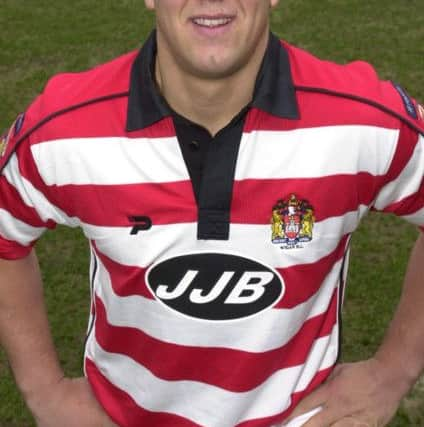

Surgeons removed a disc and a big piece of spine as they were so badly infected and ended up fusing Danny’s spine with metal caging, rods and screws.
Advertisement
Hide AdAdvertisement
Hide AdDanny recalls: “It was horrendous. I can’t describe the pain I was in. It was awful.”
When Danny eventually left hospital after three months, his world completely changed and from being fit and physically active, he was confined to his sofa.
Danny says: “I would get out of bed, go and sit on my couch all day and then at night, go back to bed again.
“It was all I could do. I couldn’t do anything with my children. I couldn’t even go to the toilet and had to use bottles.”
Advertisement
Hide AdAdvertisement
Hide AdDanny’s life was then thrown into utter turmoil when he discovered Bradford Bulls were ripping up his contract.
Danny remembers: “I got a phone call from my agent telling me that instead of Bradford Bulls paying my medical bills, putting me through physiotherapy and ensuring I had quality of life, they had decided to tear up my contract.”
Danny went from earning a decent wage as a rugby league player to nothing.
The family were living in Orrell at the time but after about six or seven months, they had to give up their home as they could not carry on with the mortgage repayments.
Advertisement
Hide AdAdvertisement
Hide AdIt was at this point when Danny first remembers being plagued with suicidal thoughts.
He explains: “Rugby league was all I had ever done from being at school. It was my life.
“Suddenly, I lost my job, my career and eventually we lost our family home.
“When I finally admitted we could not carry on with the mortgage repayments and would have to give up the house, that’s when I remember the thought of suicide first entering my head.
“Once it was there, I couldn’t get it out of my head.
Advertisement
Hide AdAdvertisement
Hide Ad“Every single moment of every single day, I was thinking about committing suicide and thinking about ways to do it such as taking pills, wrapping my car around a tree or driving into a bridge.
“The thoughts would not leave me. It was all caused by a feeling that I could not support or provide for my family and my children.
“While I was going through this, I did what most blokes do and bottled it up and kept it to myself.
“I did not even tell my wife. She knew I was in a bad place but I hid the suicidal thoughts from her.
Advertisement
Hide AdAdvertisement
Hide Ad“As a rugby player, I was always taught to never show weakness as your opponents will exploit it.
“The problem was I took this attitude into everyday life and thought it was a sign of weakness if I admitted how I was feeling or asked for help.”
Danny’s feelings escalated until he came close to committing suicide in a Wigan car park.
After he stopped himself at the last moment, he returned to going back to sitting on the sofa.
Advertisement
Hide AdAdvertisement
Hide AdHowever, a few days later, his wife and his parents sat him down and told him they had noticed a huge change in his personality and asked what was going on.
Danny explains: “I wasn’t talking to my wife and was snapping at the kids and was a totally different person and they had noticed.
“I finally opened up and I told them about the suicidal thoughts - although I didn’t tell them how close I had come to actually going through with it.
“We spent hours crying and talking.
“It was the best thing I had done. It was an unbelievable feeling and felt like a massive weight had been lifted.
Advertisement
Hide AdAdvertisement
Hide Ad“I then went to see my doctor and was put on anti-depressants which really helped.
“But the biggest thing that saved my life was talking. I talked to a counsellor - this was organised by the rugby league and I went to the Sporting Chance clinic which was set up by former Arsenal and England captain Tony Adams.
“That gave me a massive lift. Talking saved my life.”
Danny now works with mental health organisations and goes to different organisations such as sports clubs, schools, universities, police forces and fire services to share his story.
Danny explains: “There are a lot of Alpha Male men who wrongly think it is a weakness to share how they are feeling.
“I want to tell men it is not a weakness asking for help.
Advertisement
Hide AdAdvertisement
Hide Ad“If you admit you have got a problem, it is actually more of a strength.”
Danny wants to be a counsellor and has just finished his autobiography called: “Highs, lows and hypos” which will be out in November.
It deals with issues such as rugby league, his battle with depression and diabetes.
Danny says: “I was diagnosed with type one diabetes at the age of 15.
Advertisement
Hide AdAdvertisement
Hide Ad“I dislocated my knee and the doctors think the shock of that brought the diabetes on.
“A lot of people think they can’t do physical sport when you have type one diabetes but that is rubbish. You can do anything you put your mind to.”
Five years after the injury, Danny was awarded a five figure compensation fee. The claim was lodged against the club’s former holding company Bradford Bulls Holdings Ltd which is now dissolved.
Danny says: “I sued them and it took five years and they settled out of court.
Advertisement
Hide AdAdvertisement
Hide Ad“It wasn’t for the money. I did it to get them to admit what they did was wrong.
“I hate Bradford for what they put me and my family through, but I also thank them for giving me a new purpose in life.
“I really want to raise awareness about mental health and the importance of men talking.
“The statistics are frightening. Every day, 13 men take their own life - that’s a full rugby league team.
Advertisement
Hide AdAdvertisement
Hide Ad“Out of all the suicides in the UK, 78 per cent are men. That’s because women feel more comfortable talking about their feelings while men don’t.
“Depression, anxiety and stress are not killers - it is the stigma attached to them. I am trying to break the stigma.
“I now feel completely better and am happier than I have ever been - even more than when I was representing my country. Depression is an illness and it can be fixed.”
SUPPORT
A support group with a difference has launched in Preston for people living with mental health issues such as depression.
Advertisement
Hide AdAdvertisement
Hide AdPeerTalk, a non profit organisation, is behind the initiative and aims to set up a national network of peer support groups to offer support for those living with depression.
The groups are led by fully trained volunteers and offer a safe place for people to share as much or as little as they wish.
Danny Sculthorpe has spoken at PeerTalk events and strongly for PeerTalk again in Warrington in May, as he support the aims of the organisation.
Rosa Trelfa, PeerTalk project director, says: “Research tells us that one in four people experience mental health difficulties in their lives.
“Depression is a very common condition.
Advertisement
Hide AdAdvertisement
Hide Ad“Any of us, irrespective of age, gender or background, can be affected at some point in our life and the isolation and suffering that comes with depression can be hard to bear as the stigma around it prevents people from seeking support.
“The strength of these peer support groups lies in the fact that the support offered comes from others who have a lived experience of depression, who understand, who will not judge, and who can offer help from their own experience.
“There is a growing body of research looking into the effect of peer support in the field of mental health.
“Research has shown that peer support groups can lead to an improvement in psychiatric symptoms, enhanced self-esteem and better social functioning.
“The research is ongoing but the signs are good.
Advertisement
Hide AdAdvertisement
Hide Ad“As a society it seems that we’re not sure how to respond to mental health - and the media can often portray a negative image of mental health which is unhelpful.
“Attitudes are slowly changing but there’s still much work to do.
“At PeerTalk we recognise the need to share, to create the space where people will be heard and accepted and know that it’s okay not to be okay.
“In this way, people who live with depression can find a way through it with support and manage their mental health positively.”
Advertisement
Hide AdAdvertisement
Hide AdThe Preston weekly support group is held every Thursday at Central Methodist Church, Lune Street, Preston, PR1 2NL 7.30pm to 9pm.
There is no need to register in advance or make an appointment to attend a support group. Participants can just turn up.
For more details, visit: www.peertalk.org.uk
FACTS AND MYTHS
There are lots of myths about mental health. Knowing a few facts can help us to challenge any negative thoughts and actions
Here are some to think about from Time To Change led by Mind:
MYTH: Mental health problems are very rare
Advertisement
Hide AdAdvertisement
Hide AdFACT: 1 in 4 people will experience a mental health problem in any given year
MYTH: People with mental illness aren’t able to work
FACT: We probably all work with someone experiencing a mental health problem
MYTH: Young people just go through ups and downs as part of puberty, it’s nothing
FACT: 1 in 10 young people will experience a mental health problem
Advertisement
Hide AdAdvertisement
Hide AdMYTH: People with mental health illnesses are usually violent and unpredictable
FACT: People with a mental illness are more likely to be a victim of violence
MYTH: People with mental health problems don’t experience discrimination
FACT: 9 out of 10 people with mental health problems experience stigma and discrimination
MYTH: It’s easy for young people to talk to friends about their feelings
FACT: Nearly three in four young people fear the reactions of friends when they talk about their mental health problems